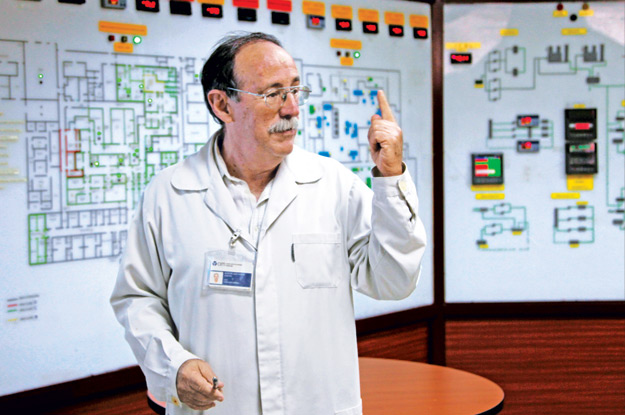See the rest of the AQ Top 5
When the world’s first therapeutic lung cancer vaccine was announced in 2011, it may have appeared to come from one of the least likely places: Cuba, whose access to investment and goods has been restricted by more than a half-century of harsh U.S. sanctions.
But to anyone familiar with Dr. Agustín Lage, the groundbreaking discovery from Havana’s Centro de Inmunología Molecular (Center of Molecular Immunology, or CIM) was years in the making. Lage has led CIM since its inception in 1991, turning it into one of the world’s top institutes for biotech and medical research and establishing a name for himself as a brilliant immunologist.
Along the way, the 67-year-old has also proven a skillful diplomat, something that Americans now stand to benefit from. Lage worked closely with counterparts in the U.S. helping to open a dialogue between the Cuban and U.S. biotechnology fields years before U.S. President Barack Obama’s visit to the island in March. And now, the cancer-fighting drug known as CimaVax is coming to the U.S. much faster than it otherwise might have.
“He is one of the major movers of biotech in Cuba and has a very clear view of the broader role of Cuban biotechnology, not only in medicine but in international dialogue,” said Dr. Kelvin Lee of Roswell Park Cancer Institute in Buffalo, New York, which expects to conduct the first clinical trials of CimaVax in the U.S. as soon as this year. The drug is not preventive but rather therapeutic, turning the cancer into a more manageable chronic disease and prolonging a patient’s life.
While Lage was unavailable to speak with AQ for this article, his reputation precedes him. A member of the Cuban Academy of Sciences and U.S. National Academy of Sciences, Lage completed his post-graduate studies at the renowned Pasteur Institute of Paris. He brought that knowledge home and combined it with a simple tool: efficiency.
At CIM, scientists can simply walk down a hallway if they want to produce a drug or plan clinical trials, skipping numerous levels of bureaucracy. CIM also benefitted from the personality of someone who brought a “tremendous amount of enthusiasm to the field and an innovative view of cancer control and treatment,” according to Lee, chair of the department of immunology at Roswell Park.
That enthusiasm and innovation were key during Cuba’s recession in the 1990s. Amid financial restraints, Lage focused on the emerging field of biotechnology to develop lower-cost drugs, with CIM racking up a number of cancer treatment patents. The result is affordable cancer treatment and a flourishing biotech sector in the middle of the Caribbean. If CimaVax wins approval in the U.S., American cancer patients will owe a significant debt to the work of the man considered “the father of Cuban immunology.”
—
Tummino senior editor of AQ and head of the AS/COA Cuba Working Group.




